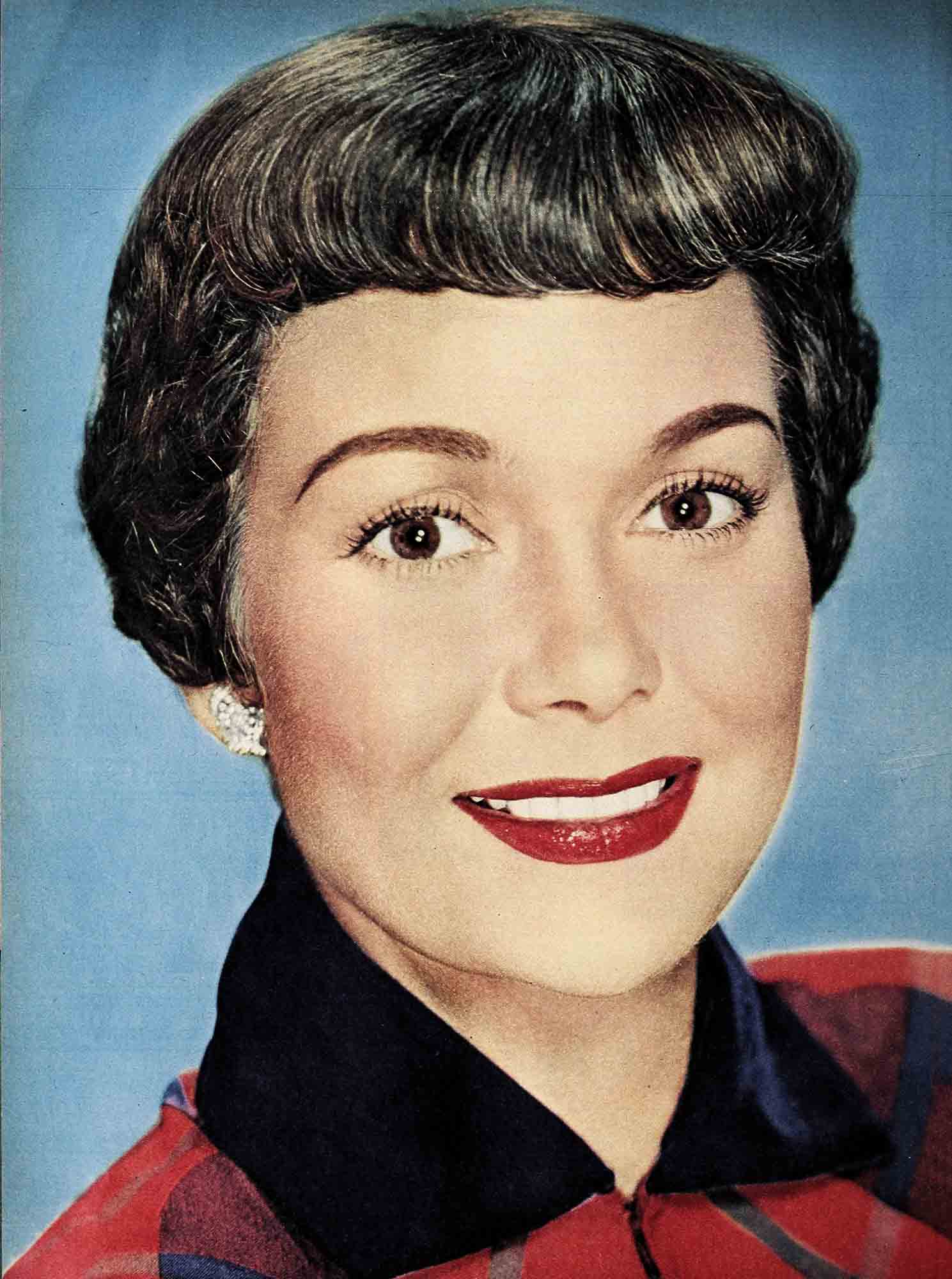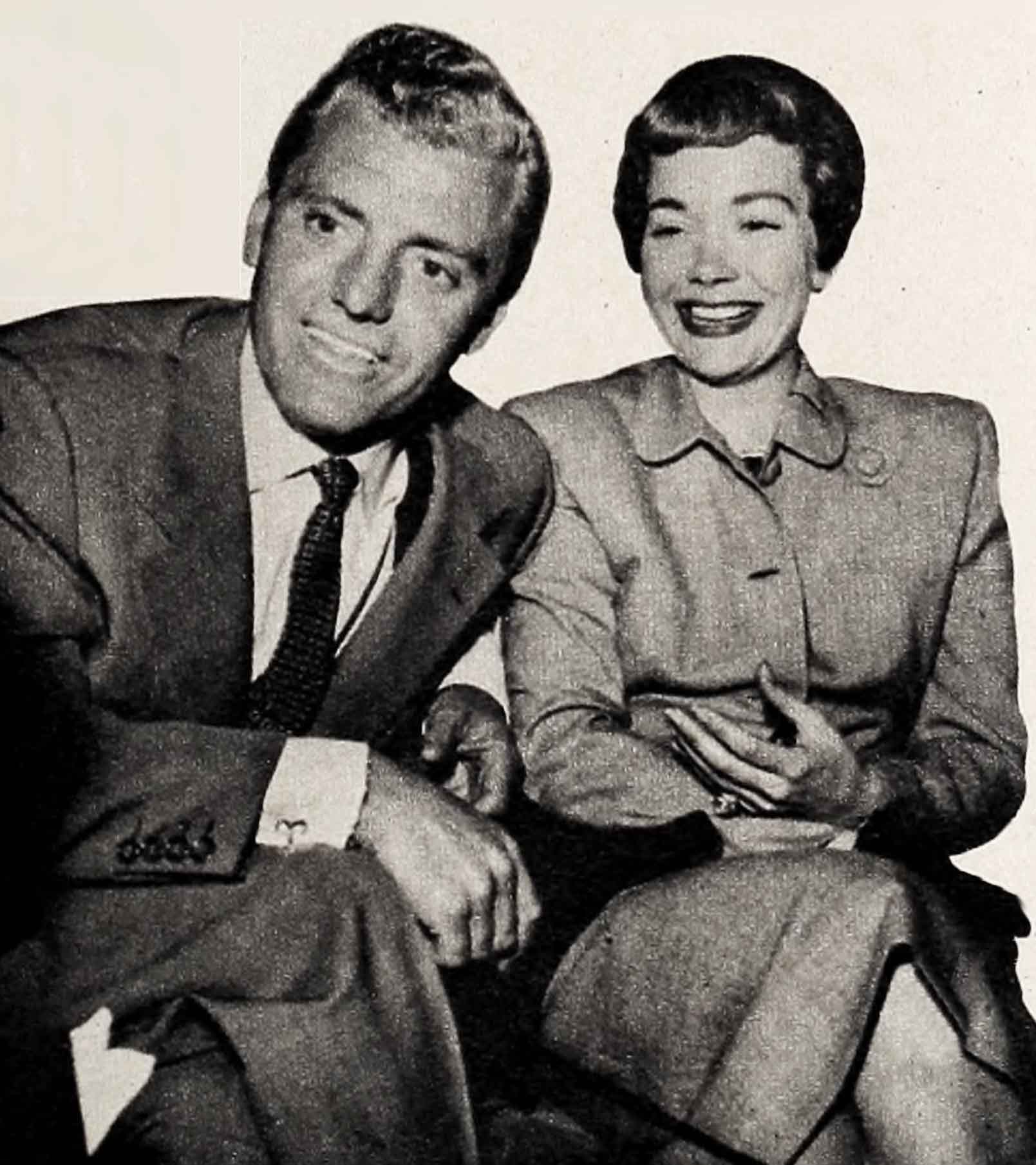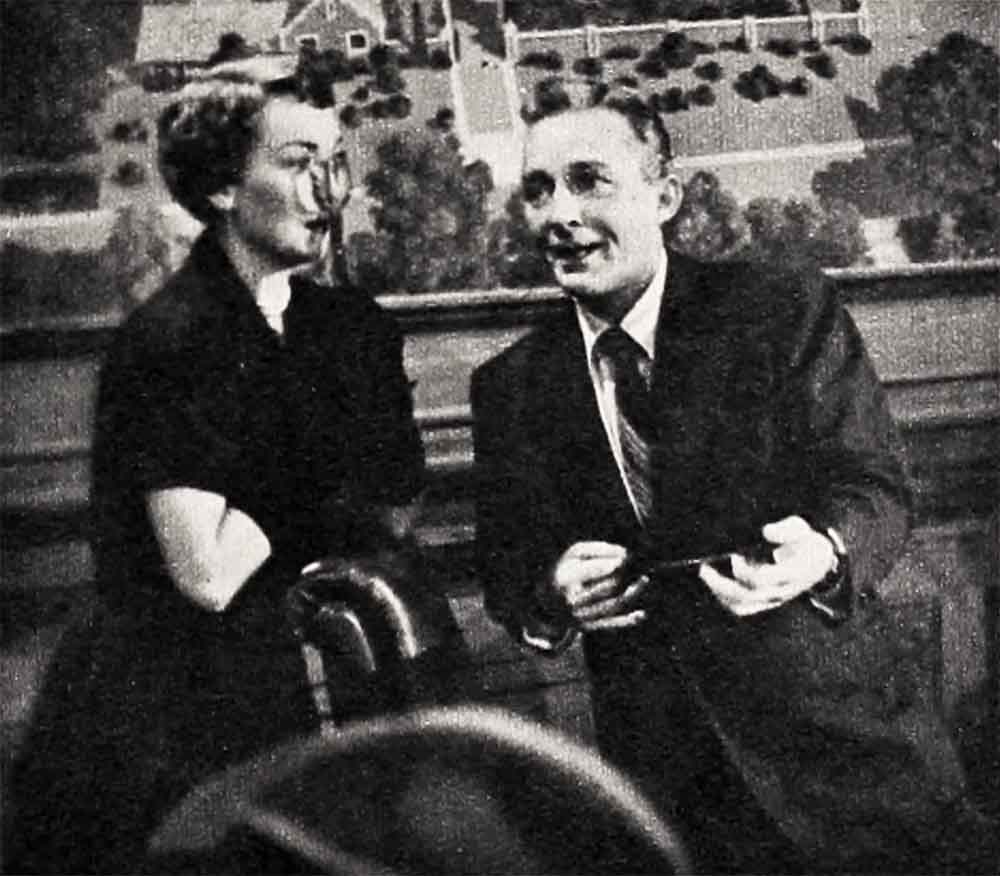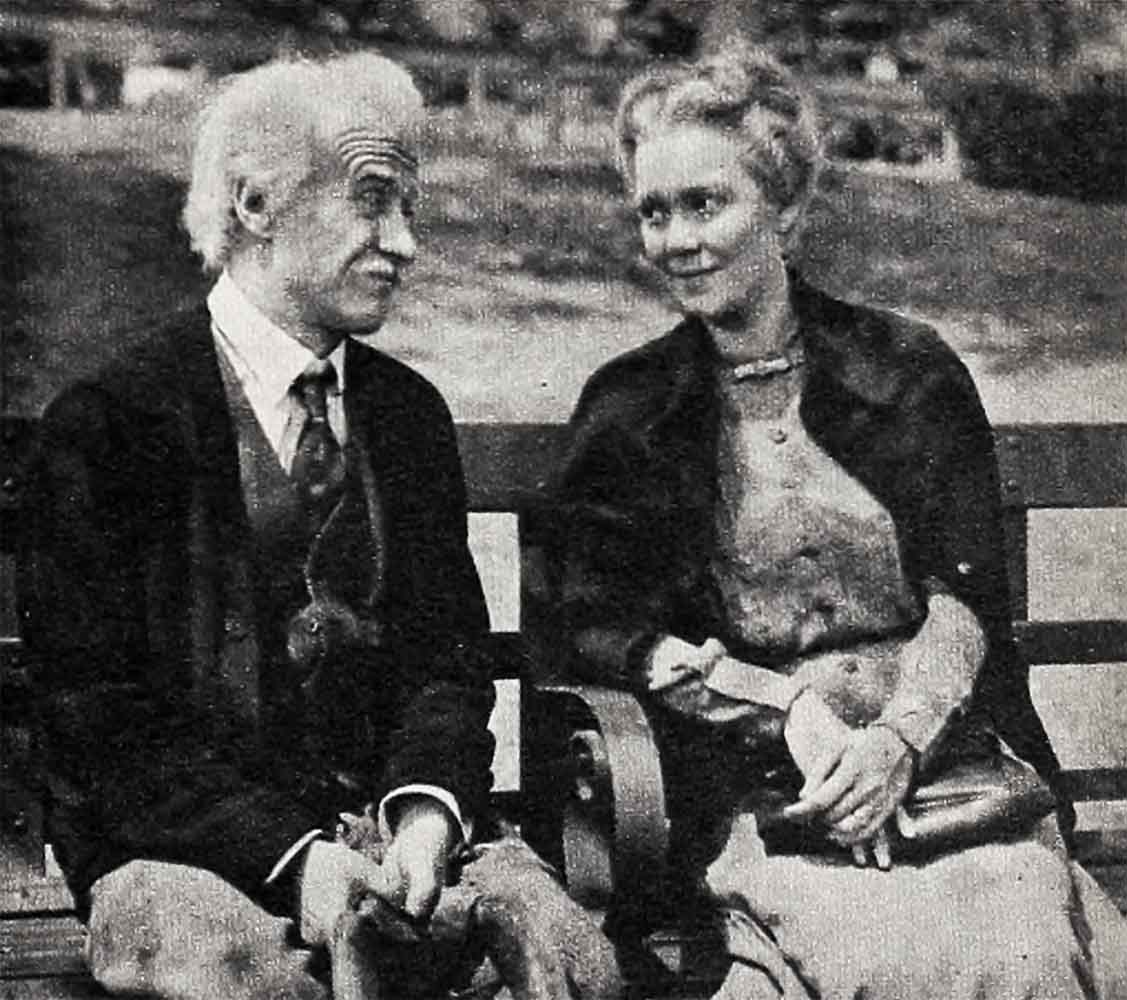In The Cool, Cool, Cool Wyman Way
The picture flickered out, the lights clicked on and Jane sat lost in reflection for a while. Then she whisked up with an air of decision, “Nah, I don’t think so. Comedy’s more fun—”
Such was her initial reaction to “The Blue Veil.” Trying to snare Wyman for the lead, Jerry Wald had asked her to look at the French version. He had caught her in the midst of a hilarious romp called “Here Comes the Groom.” Working with Crosby, Capra et al. was like drinking vintage champagne—all zing, sparkle and a heady sense of well-being. Drama twisted your nerves and left you limp as a dish clout. Who needed it? On the set a couple of days later Bing strolled over. “Got your next opus lined up?”
“I’m toying with the idea of ‘The Blue Veil.’ ”
“Kid’s clever. Plays both ends of the piano at once.”
“I’ll probably skip it—” Her gamin grin flashed. “This picture’s made me real lazy.”
“Quiet, Emmadel. Rumor has it that I sweat for my dough. Let’s keep it that way.”
Time passed, they wrapped the “Groom” up, and Bing went to the hospital for an operation. One morning Jane was driving along, minding her business, when a horn honked and a voice yelled, “Hey, Emma- del!” Who but the convalescent Crosby, riding in unwonted state with a chauffeur beside him? He poked his head amiably through the window. “What you doing?”
“Blue Veil.”

“I knew it,” he whooped. “Wyman smells a great role and unfurls her feathers to the breeze.”
June called him an idiot, blew him a kiss and drove on. Behind the Groaner’s kidding, however, she recognized truth. On the surface, Jerry Wald talked her into the part. “If it flops, we’ll all pick our whistle- stop. If not, we’ll all take our bow. But it’s a challenge, so you can’t turn it down.”
Wald is a very persuasive fellow. On the other hand, Wyman’s a gal who thinks for herself. Once convinced that a course is wrong with her, TNT won’t budge her. A wise monk named Luis Ponce de Leon once said that life reveals its beauty only if you act in conformity with your own nature. Shakespeare said it another way: “To thine own self be true—” Jane was following both when, out of a dozen possibilities, she gravitated toward the role of Louise Mason.
There’s something paradoxical about her. Years of struggle to reach the star-crowned pinnacles have left her freshness undimmed. Longstemmed, sweatered and skirted, her appearance suggests a fugitive from Vassar. Cameras can fake plenty. They can’t fake the purity of Johnny Belinda’s look. Meeting her casually, you’d call her uncomplicated. She’s anything but. Beneath the animation, the humor, the friendliness, lie depths of reserve. You can go so far and don’t cross the line. She belongs to herself. It’s a self that admits few intimates but loves humanity with a steadfast sense of responsibility. This feeling demands release and finds it in the kind of pictures she makes.

“We’re put into this world, nobody knows why. Sometimes I don’t like it. Sometimes I’d rather be in heaven or elsewhere. Meanwhile, I’m here for a certain span of years. Nothing adds up for me except how much good you can be to how many people during that span. Without a goal you don’t live, you drift. I’ve set myself quite a few. This is the only one that’s ever made sense ”
She’s traveled a long way from her early goals. In a picture headed by Joan Blondell and Dick Powell, they gave her the over whimsical name of Bessie Fumffknick, and a line to speak. And if you think she didn’t go billowing through space that day, you’re crazy—or you’ve never burst out of the chorus into a bit.
Actually, the line was as silly as the name “What do you do?” Dick Powell asked her meaning in the dance way. “I swim, ride dive, imitate wild birds and play the trombone—”
Having delivered herself triumphantly of this masterpiece, she withdrew to rest in her laurels and watch the principals, and presently found herself in a state of shock. Blondell, it appeared, was dissatisfied with something. Not only that, she was saying so out loud. Fumffknick turned big brown eyes to the hairdresser beside her. “How,” she breathed, “can anyone not like a part?” The other’s dry glance swept her. “Keep your hair on, kid. If you’re lucky, you’ll learn.”
She was lucky. She achieved her first goal—a part—and cherished it like a mother because it was hers. That phase passed, as naivete wore off, and she learned what the hairdresser meant. Keep on taking any old part, and you’re sunk.
A few years ago Jane, like a fly in amber, was imprisoned in light comedy. If she hadn’t been Wyman, she might have gone on forever, making a good thing out of wisecracking dames. But the mold stifled her and, come victory or defeat, she’d have to break out of it. Her break happened to come through Brackett and Wilder who, more perceptive than others, plucked her out of the groove to play Helen in “The Lost Weekend.” Helen led to “The Yearling” which led to “Johnny Belinda.” In the light of that radiant performance, one tends to lose sight of the courage, vision, faith and plain backbreaking toil demanded not only of Jane, but of those who helped and encouraged along the way. Time was when the hurt of Wyman in such a role would have stamped you a candidate for the loonybin—except with the few who could see beyond their noses.

Where “Johnny Belinda” opened fresh paths of understanding toward the voiceless, “The Blue Veil” promised to do the same for the aged. Jane felt she could handle the young Louise Mason. What dogged her days and haunted her nights was Louise at seventy. If you’ve never been old. hew do you feel your way into an aging body? For make-up, she had Perc Westmore—than whom, like Dinah, there’s nobody finer. But make-up was only the top. This woman had to be old from the inside, or she’d be nothing.
“You’ve got a puzzle on your face,” Charles Laughton said one day.
She looked up at him—the finished actor, the kindly human. Impulsively she asked: “Mind if I talk to you about it?”
“Talk away.”
“I have to know why old people walk the way they do. What happens to their minds and nerves and muscles? Why do their hands move more slowly? What makes them unsure of their steps? Will I find the answers in anatomy books, Charlie?”
“Some of them, yes—and others—” he tapped her temple, “—here. The books I have. I’ll mark them and bring them in tomorrow.”
He worked in the picture for only ten days, but Jane’s voice glows with thanks that he worked in it at all. “From this man whom I’d never met before I learned more in ten days than I could have learned in ten years knocking my own blundering head against walls. He made me feel old ”
Well, “The Blue Veil” is in release now, and nobody’s going to have to pick any whistlestops. For Wyman, there’s talk of another Oscar. However that may turn out, her goal is achieved. She’s made a picture worth making by her standards.
After “Starlift” she goes into “Mr Famous” with Crosby again. Because she loves working with Bing, because laughter’s also important, because you need a change of pace. “Anyway, I do. I’d rather live like a roller-coaster than a suburban train. It may not be as safe, but if one curve swoops you down, the next one lifts you higher than a church steeple. You’re maybe riding for a fall, but you know you’re alive.”

This yen for experiment helped dynamic Jane to her spot in the Hollywood sun. At the moment it seems to have helped her to a whole new career, which started with an improbable call from Bing. “Care to make Cool on a record with me?”
“Sure. Let’s swim the Channel together next Christmas too.”
“Look, junior, there’s cabbage involved. Would Everett let me kid you about cabbage?”
Finally convinced that it wasn’t the gag- of-the-month, she joined Mr. Music on the appointed day, had herself a ball kicking the song around, and drove home chuckling. “That’ll fix Crosby. There’s one he’ll never make a dime on.”
So she and Maureen were lolling round the pool when the phone rang. “This is Johnny Grant—” Johnny Grant’s a popular disc jockey. “Like to hear your record?”
Her mind was a thousand miles away. “What record?”
“The one you did with Crosby—”
Jane’s yelp cut him short. “Play, maestro, play—”
“Okay. Hang up and turn on your radio—”
If the effect tickled Jane, it electrified her daughter who’s as full of ideas as an egg of meat. She loped for the phone. “Is this Johnny Grant? I just heard the most divine song on your program. With Jane WYMAN and Crosby. I can’t remember the name. (She knew it better than her own.) Oh Mr. Grant, would you mind playing it again? It’s simply delish—” She then called sixteen friends in rapid succession. All afternoon Johnny Grant’s phone and head buzzed with girlish voices, pleading for “This terrific number I just happened to catch. Jane Wyman sounded so cute.”
You can’t tell Maureen and her clique that they didn’t have something to do with zooming “Cool” into the Hit Parade, though they’re willing to credit Crosby with an assist. Meanwhile Jane’s disbelieving ears flapped to another siren call from Decca. “ ‘Cool’s’ been such a smash, we’d like you to make two more sides with Durante, Groucho Marx and Danny Kaye.”
Her first kindly impulse was to tell them they’d lost their minds. Her next was to let them find out for themselves. “I’m game if you are. My showerbath’s taken the drubbing up to now. Let’s try it on wax.”
They waxed “How Do You Do and Shake Hands” from “Alice in Wonderland” with “Black Strap Molasses” on the reverse. It sold like mad, “Black Strap” being the side most buyers asked for. At Decca they kept turning the needle back to four lines warbled by Jane.
Muh grandpa’s older than the old gray mare,
He sits a-rockin’ in his rockin’ chair,
But now he’s got a smile that he can’t lose,
Grandma’s siftin’ knittin’ baby shoes—Obviously it wasn’t the lyrics that fascinated them. The voice, they concluded, had a torchy quality worth looking into. Jane’s next stint for Decca will be strictly on her own, except for a background chorus.
She’s gleeful as a kid about the whole deal. Sails into shops and asks brazenly for her latest record. Even enjoys being squelched, as when the girl said: “You mean with Durante, Marx and Danny Kaye—?”
“I’m sorry about the billing,” replied Jane meekly.
She’s sorry about nothing. “It’s giving me the biggest boot of my life. Even more than movies in a way, and here’s why. Movies I love, but they’re work. Singing I love, and the way I sing isn’t any work at all. You open your mouth and out comes something, and if the people don’t mind, why the heck should I? It’s that much added to the gaiety of life, and I’m no girl to look a gift blessing in the teeth.”
The gold statuette reacts dismally on some players, flopping them fiat on their dignity while they wait for another script from heaven to hit them, and often fade away in the process. Figure Bergman or De Havilland, for example, chirping away about Grandma’s baby shoes. Wyman’s a horse of a different color. Her humor, zest and endless curiosity keep her lively as an ocean breeze.
This is a far cry from the Jane of another day whose whole course was charted, and who felt that all major problems could be solved by the four walls of a house. Because furniture seemed the symbol of security, she amassed furniture. Her favorite indoor sport was shoving it around or polishing it speckless for the sheer joy of owning it. New she knows that security bears no relation to breakfronts, and can shine more steadily from the eyes of a wayside tramp than from those of a rajah. Possessions don’t mean a thing to Jane any more, unless it’s a pain in the neck. Her big house is up for sale.
She bought it for the sake of its four bedrooms, which she needed. Three living rooms she didn’t need, but they came with the place and she couldn’t figure how to send a couple back on credit. As the kids went off to school, Jane found herself rattling around like a penny in an outsize piggy-bank. One day she addressed herself to Carrie, the housekeeper who’s been with her for years. They call each other Ma, and probably nothing but death could part them. “Ma, know what I’d like? A place you could take care of alone, with somebody in to do the laundry.”
“Now you’re talking, Ma. When do we go?”
“Let’s see what the kids think.”
Maureen, a firecracker for enthusiasm, promptly sat down to design herself a dream bedroom. Michael had one reservation. “Where am I going to stick my tennis racket?”
“In the garage.”
“I can’t look at it there.”
“You can look at it every night and every morning, and it’ll be nice company for the car.”
Mike’s a car-lover. “Okay,” he agreed. With all hands satisfied, Jane put her house on the market and felt a rush of freedom to the head.
To Maureen and Michael, their mother’s a friend. To her, they’re a source of delight, amusement and occasional confusion.
At eleven, Maureen’s as tall as her mother—a development that sent her into swirls of ecstasy. Jane found this flattering, if a trifle excessive, till Maureen spun down and came to a starry-eyed halt. “Just think, Mother. I can wear your clothes now.” In search of her best sweater, Jane’s likely to locate it on her daughter’s back.
She makes it a rule to arrange working schedules so that her free time coincides with summer vacations and she can give the children all her attention. Tennis with Maureen in the morning, pingpong with Mike after lunch, and such evening galas as the Ice Follies or ballet at the Bowl. Conversation spicing everything, and ranging from idle chatter to what Maureen calls a “real heart-to-heart—” Warm afternoons bring a flock of bright-suited youngsters—Maureen’s gang—to cavort in the pool, listen to records and lap ice cream cones.
You’ve often heard that the children of movie stars are spoiled, blase and over-sophisticated. This is as true as most generalizations. Some are, some aren’t and, as with the children of bankers or boilermakers, the difference depends on training. There’s nothing remotely blase about these two. Maureen, for example, reacts to movie stars like the eleven-year-old in your own house. Plasters her room with profiles till the walls are all thumbtack holes and, when Betty Hutton drops in to see her mother, asks shyly, “Please, may I have your autograph?”
Jane never permitted Maureen to see “Johnny Belinda.” Comedy, yes, but drama, no, she decreed. “We’d both had all we could take with ‘The Yearling.’ My child wouldn’t speak to me for two weeks because I killed the deer.”
But “The Blue Veil” came along and Maureen was older and the premiere would be something for that rabid fan to remember. “How would you like to go?” asked Jane superfluously.
Her daughter’s delirium was broken by a wail from her son. “You never take me any place.”
“Darling, you know that’s not true, but I certainly can’t take you to this when you’re not even seven. Besides, you’re going to the ranch, you’ll ride your goat.”
No soap. Burrowing his head in her lap he refused to be comforted till he came up with streaming eyes and his own solution. “If I don’t get to see the Beil— (his “V’s” are uncertain), you’re going to have to take me to ‘The Groom Went.’ ”
Jane needed to see “The Groom Went’’ like she needed forty-eight heads, but fair’s fair. Michael escorted his mother to a matinee and emerged with a sense of masculine superiority. “You won’t like the Beil at all,” he informed Maureen. “In the Beil, Mommy doesn’t sit on the other lady’s stomach.”
To Hollywood at large, the premiere of “The Blue Veil” was Wyman’s night. Jane, between mirth and tenderness, knew that Maureen was the true fairy princess, treading glory, untouched by the realities of the grown-up world. Dressed like her mother in black velvet, she stepped out of the car into storybook land—lights popping, fans yelling, beautiful movie stars in beautiful clothes smiling and saying hello to her.
But the evening’s most glamorous event was the picture itself. It sucked her in and drowned her, so that presently a sob shattered the silence—loud, gusty and issuing unmistakably from a child in black velvet sitting beside the star.
“Maureen—” Another sob. “Holy cow!” thought Jane, and shook her out of her trance. “Stop crying, Maureen.”
“But, Mother, it’s so sad—”
“The saddest is yet to come. Especially if you don’t hang on to yourself.”
By fadeout time, Maureen was a limp and happy mass of tears. By some alchemy she also managed to translate herself into queen for the evening, welcoming Jane’s friends as they dropped in later, accepting congratulations for her mother. Next morning Jane heard her on the phone with a chum. “Well, of course I saw ‘The Blue Veil’ . . . three handkerchiefs, sopping wet, don’t miss it. . My mother? Well, I want you to know she was sitting right next to me, and she wasn’t moved at all. I don’t believe my mother understands drama—”
In today’s world no one can be at peace. You can, however, set your own house in order. Through her children, her work, her grasp on essential values, her sense of profound oneness with mankind, Jane’s achieved that inward balance which makes for serenity. But she differs from the woman in the story who, asked for the secret of her happiness, said: “Ah done quit strivin’.” So long as there’s room for growth—meaning while life and strength remain—Jane will go on strivin.’
From an editor’s viewpoint, no story’s complete without a touch of romance. Jane thinks that’s too bad. Everything she put into her work, which is plenty, belongs to the public. The rest belongs to herself. Trying to poach on her reserves will get you nowhere. It’s an open secret, for instance, that she dates Greg Bautzer. Ask her about him, and she’ll say, “He’s a nice guy—” Then the air goes dead.
Yet she doesn’t hesitate to report a recent proposal. The gentleman entered her bedroom and laid it on the line. “Mom. will you marry me—?”
A fine time, she groaned to herself, with one eye open, to explain to your son that he can t marry his mother. Lifting herself on an elbow, she made the attempt. “Someday you’ll meet a nice little girl and bring her home and say, ‘Mom. this is the girl I want to marry.”
Mike would have no part of this. Brooding, he wandered down to Carrie. ST asked Mom to marry me and she won’t.”
Since Carrie had both eyes open, she went into the situation more thoroughly, with no marked effect on the young suitor’s spirits. Then another idea popped, and he brightened. “Well, if Mom won’t marry me, I guess I’ll just have to marry my goat.”
With that romantic angle we trust we leave our readers happy. Anyway, it’s the only one we could get.
THE END
It is a quote. PHOTOPLAY MAGAZINE JANUARY 1952





No Comments